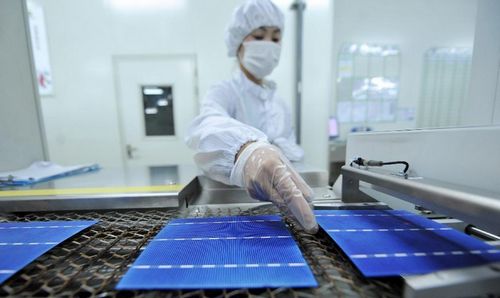EU polysilicon probe sparks 'trade war'

China initiated an anti-dumping and anti-subsidy investigation into EU-made solar energy material products Thursday, in response to a European probe into Chinese solar panels dating back to September.
A Ministry of Commerce (MOFCOM) press release showed that complaints had been received from a number of companies, including Jiangsu Zhongneng Polysilicon Technology Development, LDK Solar, Luoyang Sino-Silicon and Daqo New Energy, on September 17. These complaints requested an assessment of the negative impact they had suffered from solar-grade polysilicon products made in and imported from the EU, the ministry's Bureau of Fair Trade announced.
The Chinese companies also requested that the investigation into the EU be combined with previous anti-dumping and anti-subsidy investigations into US and South Korean polysilicons.
MOFCOM accepted the requests Thursday, and said it would take legal and fair decisions.
Polysilicon is used to manufacture solar panels, and China is one of the largest solar panel exporters in the world. The country imports most of its raw material from the US, South Korea, and Germany, according to statistics from the Silicon Industry Chapter of the China Nonferrous Metals Industry Association.
China imported 3,992 tons of polysilicon from Germany in September, a 280 percent increase year-on-year.
This significant increase in imports "resulted from a halt in production by a majority of domestic enterprises," Jiang Shimeng, marketing director of LDK Solar, told the Global Times on Thursday. However, Jiang declined to comment on the ongoing MOFCOM probes.
More than 80 percent of 43 Chinese polysilicon makers have halted production after their profits collapsed, with some of them going into liquidation, the People's Daily reported in July.
The cost of churning out a kilogram of polysilicon is around $30, the newspaper reported, citing GT Solar, the world's leading supplier of polysilicon production equipment.
Polysilicon imported from Germany, South Korea and the US was sold at $26.83, $22.05 and $19.3 a kilogram in September respectively, according to a Global Times calculation based on Silicon Industry Chapter data.
Polysilicon import prices have declined as quantities have increased for almost a year now. This, combined with the prolonged dumping, has pushing the entire domestic industry into a "life-or-death situation," the Silicon Industry Chapter said in September.
The US slapped anti-dumping tariffs on Chinese solar panels in May, while the EU launched its own probe into Chinese products in September. China decided to fight back with US and South Korean probes in June, and the EU one on Thursday.
Both these foreign countries and China have taken "wrong steps" in implementing trade protectionism, because all the remedial measures "violate the principal of free trade … and damage the WTO multilateral trade mechanism," He Maochun, an international relations professor at Tsinghua University, told the Global Times on Thursday.
As a major importer and exporter of solar products, China needs free trade and competition to upgrade its own industry and enlarge the international market, He said.
But he was not optimistic on any short-term resolution to the "solar trade wars" because of political pressures derived from the US election and the European economic depression.
MOFCOM said that its investigation would be completed within a year, but may be extended for another six months should special circumstances arise.
Chinese companies sold about 21 billion euros ($27.1 billion) in solar panels and components to the EU in 2011 - about 60 percent of all Chinese exports of the products and some 7 percent of all Chinese exports to the EU, according to Reuters.
Major producers, including Suntech Power Holdings and Trina Solar, are turning to the domestic market, now one of the world's biggest, for solar energy development, the report said.